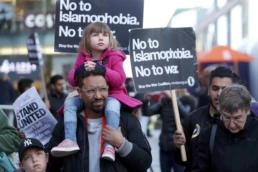For decades (if not a couple of centuries) many Muslim writers, scholars and thinkers have sought to analyse the decline of believers and how to rectify it. Suggestions range from knowledge and ‘religiosity’, to lack of agility or colonialism. I feel that a lot of these are either symptoms or describe the process by which believers got to this situation. But they don’t address the underlying cause. For example, a lack of knowledge might be why people do or think silly things, but knowledge is widely available, in fact, far more available than it has ever been at any time in human history. From one perspective, being a mujhtahid (if we’re talking about Islamic Law), a doctor or an economist today should be a walk in the park in comparison to the past. So saying it’s a lack of knowledge is pointing out the obvious symptom – a constructive analysis would tell us why people would rather remain uninformed, and of course, the ‘why’ is subject to context, place, and culture under scrutiny.
In the UK (and as I suspect other places as well), I feel that Muslims suffer a few pathologies that debilitate them. Here, I argue it is a matter of individual psychology, social psychology and culture – all of which need to develop before we speak of anything else. You cannot address state formation or institution building (whether that’s schools, hospitals, madrassas, mosques, or even the ministry of finance!) until you have a sound political culture and a solid social group. Until you know how to communally deliberate. Until you know how to agree, disagree, and reach somewhat of a consensus. Until you’re all on the same page. This is how civilisations become civilisations. This is one of the fundamental differences between the east and west at the moment. Of course, in the past it was the east that enjoyed a stout political culture and the west suffered its dark ages.
…the more Muslims complain about something the more the DON’T get it, the further from it they seem to be, and the more everyone else either dislikes them or holds them in contempt. The more their opponents win! So then they complain even more, and people dislike them even more – its just spirals downwards until they’re a million miles from what they want and lose embarrassingly.
But coming back to the British Muslim present, amongst a few pathologies I feel that are the most problematic are a) self entitlement and b) a superiority complex – both of which severely hold Muslims back. And both are very much misplaced. How so? Well: a) the natural order is that everything is earned, you’re not automatically entitled to anything, especially as a social group, and b) Muslims aren’t superior in anything at the moment.
This, as we often see, result in merely complaining, assuming that complaining is enough to get something. But no it really isn’t, it’s actually just irritating and puts people off. You see it with the youth vs older people in mosques, you see it with Muslim communities engaging in the public domain.
And that’s why, and quite humorously so, the more Muslims complain about something the more the DON’T get it, the further from it they seem to be, and the more everyone else either dislikes them or holds them in contempt. The more their opponents win! So then they complain even more, and people dislike them even more – its just spirals downwards until they’re a million miles from what they want and lose embarrassingly. And of course, with no actual strategy and focus, they just move on the the next arbitrary issue their rabble rousers bring to their attention and the cycle starts again! In reality, the whole ‘speak your truth’ and ‘raise awareness’ malarkey doesn’t work for Muslims although it might for others, simply because they have no clout, whereas others do however nominal. Seemingly not having realised this, Muslims actually think what they do across the board is meaningful, but it’s generally and embarrassingly a fail, which for some reason everyone except them can see.
BUT can this change? Yes of course. It requires the development of a sound public/political culture, which itself requires civility and intelligence to rise to the surface. The perpetual question remains, is there widespread appetite for this now, where significant numbers of people want to be different? I honestly don’t know.
However, I feel we can start in small social groups. In every major city people can come together and have the relevant conversations and engage in the processes of socialisation that brings together God’s will and social formation. They can communally form a unifying political and public culture which then grows. And the virtual world can help for sustained engagement in-between. It can be one where intelligent and civilised folk gather, informed by the informed, the non-reactionary that are not led by the baggage of past-battles, and legitimately shaped by local culture.
I’ve been ready for quite a while, and so have a few others. And we’re REALLY happy doing our thing and we hold the aspiration to excel in whatever we engage. I’d happily sit here and list names and what they excel in – I thank God for these people. In the least, we have a space where all are welcome to come, where scripture, reason, the shari’ah and considerations of lived realities reign supreme. But it’s no free-for-all, there are expectations around conduct, values, principles, and engagement – all which the sunnah teaches us.
We do not hold baseless or uninformed opinions to be opinions, and we recognise that these things today can be hard to identify because people seldom socialise with others who can highlight them. We aspire to a space that brings the best out of people, where people can comfortably make mistakes – and enjoy making them! – in the process of unlearning and learning.




